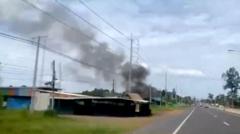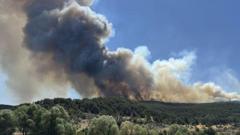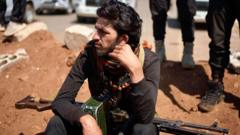Recent border skirmishes between Thailand and Cambodia have intensified, claiming at least twelve lives. As accusations fly over the origins of the violence, both governments bolster military presence and impose restrictions, raising fears of a prolonged conflict with implications for regional stability.
Escalating Tensions: Thailand and Cambodia Clash at Border

Escalating Tensions: Thailand and Cambodia Clash at Border
The historic feud between Thailand and Cambodia reignites, resulting in deadly confrontations and rising casualties.
Fighting reignited between Thailand and Cambodia on Thursday after long-standing tensions erupted into violence, resulting in the deaths of at least 12 Thai nationals, predominantly civilians. The Cambodian death toll remains unconfirmed. Hostilities reportedly began with gunfire exchanged along the border, with each nation accusing the other of instigating the violence. Thailand claims Cambodia responded to their troops with rocket fire, prompting Thai air strikes on Cambodian military installations.
This ongoing dispute is deeply rooted, stretching back more than a century to the post-French colonial era when boundaries between the two nations were drawn. An official escalation occurred in 2008 when Cambodia sought to register a contested 11th-century temple as a UNESCO World Heritage Site, provoking fierce Thai protests. Since then, sporadic confrontations have led to both military and civilian casualties.
In recent months, tensions escalated further after a Cambodian soldier's death in a clash. Bilateral relations hit a low point, prompting both countries to impose border restrictions and bolster troop deployments. Cambodia ceased imports of certain Thai goods and halted vital utility services while restricting internet access, increasing hostilities.
Accounts of Thursday's events vary significantly between the two nations. Thailand’s National Security Council states that Cambodian drones surveilled Thai troops before military personnel on the Cambodian side commenced firing. In contrast, Cambodia alleges that Thai forces breached an agreement by encroaching on their territory, provoking a defensive response.
Thailand's acting Prime Minister, Phumtham Wechayachai, recognized the fragility of the situation, suggesting careful handling in accordance with international law, while Cambodian Prime Minister Hun Manet emphasized the necessity of armed response against aggression. Observers express concern over the potential for escalation, citing a lack of decisive leadership on both sides.
As the conflict remains localized for now, travel advisories by some countries, including the UK, urge caution for those in or around the area, especially near significant tourist sites. China's government has also cautioned its citizens in Cambodia to avoid the Thai border region. The evolving situation continues to necessitate close monitoring for further developments.





















